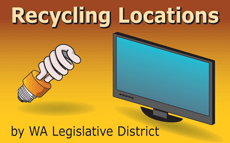
Non-profit Mercury Programs
Several non-governmental organizations across the United States have organized to promote product stewardship of mercury-containing products. Listed below are programs that are helping to promote the proper handling of products that contain mercury, reduce mercury pollution, and eliminate mercury from products altogether.
Sierra Club |
Guidelines for Selecting, Distributing and Recycling Environmentally-Preferable Light Bulbs During Mass GiveawaysThe Sierra Club has written a set of guidelines to help local local municipalities and community groups design CFL distribution programs (PDF file, 874KB) that incorporate environmentally-friendly purchasing, product stewardship and recycling information of CFLs. The document also includes model policy language for producer responsibility of CFLs. |
Guidelines for distribution programs include using certified Energy Star products, requiring companies to disclose mercury content, choosing manufacturers participating in take-back programs, choosing lead-free CFLs, providing local recycling information and fact sheets to consumers, and providing instructions regarding CFL breakage.
The document also provides recommendations for individual consumers when selecting CFLs. Recommendations include choosing Energy Star products, buying CFLs with long life expectancy, using CFLs with the greatest efficiency and fewest watts, buying from retailers participating in take-back programs, choosing lamps made by companies pledging to keep mercury content below 5-6 mg, and buying CFLs that are lead-free.
 |
The Mercury Policy ProjectThe Mercury Policy Project (MPP) is a project of the Tides Center formed in 1998 to raise awareness about the threat of mercury contamination. |
MPP works to promote producer responsibility and policies to eliminate mercury uses, reduce the export and trafficking of mercury, and significantly reduce mercury exposures at the local, national, and international levels. MPP has issued numerous reports on reducing anthropogenic mercury use, release and exposure to mercury.
 |
The National Wildlife FederationIn 1999 the National Wildlife Federation in cooperation with 20 other organizations initiated the Clean the Rain Campaign. The Clean the Rain Campaign aims to alert the public to the problems of mercury pollution and the effects it has on human and wildlife health, and to implement initiatives to reduce mercury pollution. |
These initiatives include outreach activities around mercury-containing products, launching and supporting pollution prevention initiatives, and working to win statewide mercury phaseouts and other regulation or legislation to reduce mercury pollution. Read the campaign's Mercury Products Guide: The Hidden Dangers of Mercury (PDF file, 947KB) and find other documents on Mercury contamination in water.
 |
Mercury in SchoolsThe Mercury in Schools program was started in 1999 by the University of Wisconsin Extension's Solid and Hazardous Waste Education Center. The program aims to education students and teachers about the hazards of mercury, recycling and management options, and how to eliminate mercury use in schools and homes. |
In 2001, funding was obtained to extend the program to the rest of the country. The program provides information and resources for teachers, individuals and others.
 |
Health Care Without HarmHealth Care Without Harm promotes transforming health care so that it is ecologically sustainable and no longer poses a threat to human or environmental health. They work by promoting pollution prevention techniques, supporting development of environmentally safe alternative products, and educating healthcare professionals and institutions about the impacts of practices and the solutions. Many products in the healthcare industry contain mercury. Learn more how Health Care Without Harm is addressing mercury. |
